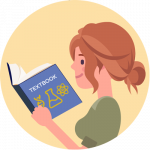Allow me to take you back to the best days of your life. A time where you didn’t have to worry about a mortgage, a time where Brexit was merely fictitious concept, and a time where you didn’t have to worry about that massive pile of bills you’ve horded in your bed side draw. It’s fair to say times were a lot simpler. My only concern was dropping my plate in the dining hall or being rejected by girls far above striking capabilities. Looking back now, school was a good time for me. Yet, as I become older and spend more time absorbing myself in the often more interesting world of literature, I can’t help but dwell on those books I read and studied during my school career. If you grew up in the UK, I’m sure you’ll recall a handful of books synonymous with school level English literature. Some of these I enjoyed, some I did not, but aside from that, I’m fully certain that I won’t forget them in a hurry. Warning, a few spoilers ahead.
Lord of the Flies
Lord of The Flies was written by Nobel Prize winner and novelist, William Golding. The book’s plot centres around a group of young boys who are stranded on a desert island after a plane crash. The boys initially unify into a tribe, but as time goes on and various emotions are tested, we see a decent into the core animalistic nature of humans. The book explores various themes such as the division of rational and emotional reactions, how groupthink and individuality clash and, at its heart lies a subtext of the tensions between human impulses and civilisation.
If you were anything like me, Lord of Flies may have been one of the first books you studied in your senior school career. For me, it was the first time I began to properly understand how an author could use literary devices to subtlety convey features of a book. Before that, I’d often just taken what an author said at face value. Whether that’s because I thought over-analysing was a load of non-sense or because my prepubescent brain simply couldn’t comprehend anything more complex than a spherical leather ball, we’ll never know. However, learning about the, ‘Conch’ and how it symbolised civilisation and understanding the various areas of foreshadowing throughout the book, exposed me to a whole new world of subtext and theme, which previously I’d naively dismissed.
Macbeth (Insert Miscellaneous Shakespeare Book)
The quote, “Is this a dagger which I see before me, the handle towards my hand?” is taken from a very famous soliloquy in Macbeth, whereby Macbeth is preparing himself to commit the unforgivable act of killing the King of Scotland, Duncan. This pivotal point in the play, is where Macbeth begins his crazed killing spree with the corrupt ambition of ruling as King of Scotland. This tragedy, centres around a Scottish General, Macbeth who, through the manipulation of three witches and the encouragement of his wife, commits regicide to take the Scottish throne. However, he is then plagued by guilt and paranoia which eventually result in his own demise. Like many Shakespearean tragedies, Macbeth explores a variety of different themes: ambition, violence, the supernatural as well as fate vs free will. It’s important to remember that, as well as being a book, Macbeth was originally a play. Meaning all the emotion and themes in the book are designed to also be brought out on stage – not an easy task.
Even now, with my newly found worldly wisdom and heightened ‘sense’ of intelligence, I still have the same blank expression when trying wade through Shakespearean language and old English. Each sentence is like a complex string of poetic phrase that, to be understood, requires a broad and interpretive mindset as well as an in-depth understating of the English language. I always felt that English teachers had some sort of supernatural gift being able to understand Shakespearean language. When I gazed down upon the pages, all I saw a string of long words in a strange order. Having said this, once It was translated to me, by a teacher or the internet, I enjoyed Shakespeare. I enjoyed watching or reading as the theatrical plot unravel. It was interesting, compelling, and once got me out of a Thursday afternoon Maths test when we went to watch Macbeth at the West Yorkshire Playhouse- My 14-year-old self will always be eternally grateful.
The Crucible
Written in 1953 by the American playwright, Arthur Miller, The Crucible follows the partially fictionalised events of the Salem Witch Trials, which occurred in Massachusetts back in the seventeenth century. At the time the play was written, there was much concern in the US over communism. Driven by the media and the government, many people were frightened that communistic influence may spread to the States and affect their way of life. The Crucible therefore was written as an allegory for McCarthyism. This is the practice of making an accusation of subversion or treason without the proper regard to evidence. The Crucible therefore draws parallels between communism In the US and witchcraft in Salem, as well as the accusations of US Government towards suspected communist and absurdity of the accusations throughout Salem Witch Trials.
If I’m honest, myself and the Crucible never saw eye to eye. Whilst I found some of the historical context interesting, I found the character’s social manipulation and blinkered views a tad frustrating. The concept of the young Abigail accusing people and subsequently starting off this ludicrous chain of trials and hangings over something which didn’t exist, really bugged me. Whilst I acknowledge this is exactly what Miller was going for, referring to the over arching allegory of communism and McCarthyism, I simply felt frustrated by reading and studying it. Having said that, there was one saving grace; my larger than life Scottish literature teacher. Armed with thick Scottish accent and full ginger beard, he would often stride round the class reading sections from the book and even acting out scenes to an Oscar winning standard. What made this spectacle even more amusing, was that every single character, still sounded like a 40-year-old Scott from the depths of the Highlands; even little Betty Parris, a 10-year-old girl.
Of Mice and Men
When I was at school, if you were to ask any 16 to 18-year-old what the most iconic moment in literature had ever been, I’d bet that the majority would say when George takes Lennie to the river and… well, I think you all know the rest. This iconic scene of course comes from John Steinbeck’s Of Mice and Men. This Novella follows two migrant ranch workers, George and Lennie, who are traveling around California in search of employment during Americas Great Depression. Throughout the Book, Steinbeck explores themes such as loneliness, companionship, and dreams. In the book, we learn that George and Lennie’s aspiration is to be able to have their own modest farm. However, this becomes more of a ‘pipe dream’ as the book continues. Many people have commented on this as being Steinbeck showing the futility of the “American Dream”.
For me, Of Mice and Men is a classic. Yes, it’s true; everybody knows the ending before they’ve read the book. Thanks to a pesky older sibling or mischievous year ten, who thought it would be funny to scribble ‘the spoiler’ in the top left-hand corner of the inside cover, this was never in any doubt. However, that doesn’t matter. Of Mice and Men is an interesting and compelling book where each character is unique thanks to Steinbeck’s development. Yes, you probably analysed the living daylights out of it by the end, but you must admit, there was a lot to say. Of Mice and Men is littered with all manners of literally devices, which is why it was, and still is, such a popular book to study at school.
Cambridge Latin Course Textbook 1
Where would this list of books be without the infamous Cambridge Latin Course textbook. Featuring such memorable characters as Metella, Grumio and of course, the big man himself, Lucius Caecillius Lucundas. The textbook is based around Caecillius and his Roman family. Its aim is to aid students in their understanding of rudimentary Latin through the thrilling exploits of Caecillius, his family, and his Roman chums.
Whilst I ‘studied’ Latin for two years in my early teen life, the only thing I remember is one of the ‘tense rhymes’ we used to hysterically chant and, “Caecilius est in horto” which translate to “Caecillius is in the garden”. Impressed? Didn’t think so. It therefore may not surprise you to hear that I failed Latin.
Have you got any old books gathering dust on the shelf? Why not sell them to Zapper today! Sell your second-hand books or textbooks and receive quick and easy cash. Simply, type in or scan the barcode using our app and receive an instant valuation. Then it’s as simple as sending your unwanted items in and getting cash.

















